Council of the Federation
| Conseil de la fédération | |
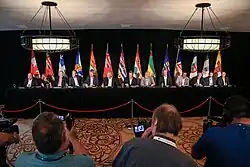 2018 Council Members | |
| Formation | 2003 |
|---|---|
| Headquarters | 360 Albert Street Ottawa, Ontario, K1R 7X7 |
Chair | Rob Lantz |
Vice-Chair | R.J. Simpson |
| Website | canadaspremiers |
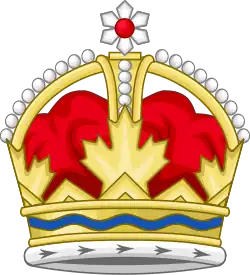 |
|---|
|
|
The Council of the Federation (COF; French: Conseil de la fédération) is a multilateral congress composed of the premiers of each of Canada's 13 provinces and territories, which meets at least twice annually.
Its main function is to promote interprovincial-territorial cooperation, collaborate on shared governmental priorities, and ultimately provide a united front amongst the provincial and territorial governments when interacting with Canada's federal government. It also promotes "constructive Confederation", working for Canadian unity, and recognizing differences amongst the various provinces and territories within Canada's federal system of government.
The council meets at least twice a year, with an annual summer conference held in the jurisdiction of the Chair, which rotates annually between premiers; and at least one other meeting at a location determined by the Council. The Council also meets via teleconference periodically throughout the year.[1]
History
The idea for a body akin to the Council of the Federation had long been present, but suggestions did not come to fruition until after Quebec premier Jean Charest raised the concept again during preparation for negotiations with the federal government. The idea was for the first time embraced by all the premiers and the council was formed, its foundation being announced on December 5, 2003, in Charlottetown, Prince Edward Island. This location was significant because Charlottetown was, in 1864, the venue for the Charlottetown Conference (the first step towards Canadian Confederation).
The first test of the council's united front occurred between September 13 and 16, 2004, when the premiers met with Prime Minister Paul Martin to discuss reforms to Canada's universal healthcare program. The premiers remained united and in the end won $41 billion of federal funding for healthcare over the next ten years.
The 2008 meetings of the council took place in Quebec City, which was celebrating its 400th anniversary as a settlement. At the meeting all premiers agreed to amendments to the Agreement on Internal Trade to create greater labour mobility between the provinces and territories, which came into force on January 1, 2009.
The 2009 meetings of the council took place in Regina, Saskatchewan. The agenda was dominated by economic matters including trade issues with the United States and formulating a post-recession interprovincial economic strategy.
On February 20, 2010, the council met with their American counterpart, the National Governors Association, in Washington, D.C., for an hour-long session entitled "Common Border, Common Ground" to talk about issues such as environment and trade. Also attending this meeting were Lisa P. Jackson, of the United States Environmental Protection Agency (EPA), and Larry Summers, U.S. president Barack Obama's economic advisor. The Canadian premiers commented on how much more open the Obama administration was to confronting and solving problems, compared to his predecessor, George W. Bush.[2]
Chairs of the Council of the Federation
| Chair | Province/territory | Term start | Term end | Party | |
|---|---|---|---|---|---|
| Doug Ford | August 1, 2024[3] | August 1, 2025 | Progressive Conservative | ||
| Tim Houston | July 12, 2023[4] | August 1, 2024 | Progressive Conservative | ||
| Heather Stefanson | September 27, 2022[5] | July 12, 2023 | Progressive Conservative | ||
| John Horgan | September 16, 2021[6] | September 27, 2022 | New Democratic | ||
Issues
- Healthcare funding and innovation
- Economic development (especially in the wake of the Bovine spongiform encephalopathy crisis)
- Strengthening Confederation (working for provincial input into the selection of senators and Supreme Court justices)
- Reaching out to young Canadians, getting them involved in the political process
- Helping those affected by emergencies
- Inter-provincial/territorial trade
- Water
Members
| First minister | Jurisdiction | Party | Notes | ||
|---|---|---|---|---|---|
| Provinces – Provincial premiers | |||||
.jpg)
|
Doug Ford | Ontario | Progressive Conservative | ||
.jpg)
|
François Legault | Quebec | Coalition Avenir Québec | ||
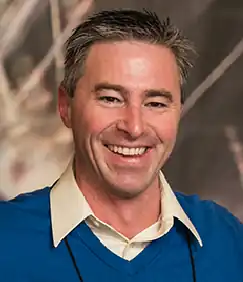
|
Tim Houston | Nova Scotia | Progressive Conservative | ||
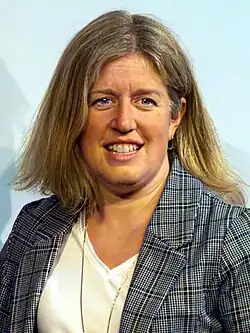
|
Susan Holt | New Brunswick | Liberal | ||
.jpg)
|
Wab Kinew | Manitoba | New Democratic | ||
_(cropped).png)
|
David Eby | British Columbia | New Democratic | ||
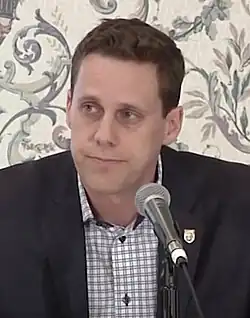
|
Rob Lantz | Prince Edward Island | Progressive Conservative | Current chair | |
.jpg)
|
Scott Moe | Saskatchewan | Saskatchewan | ||
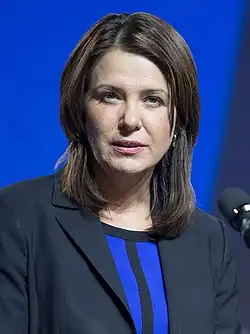
|
Danielle Smith | Alberta | United Conservative | ||
.png)
|
John Hogan | Newfoundland and Labrador | Liberal | ||
| Territories – Territorial premiers | |||||
| R.J. Simpson | Northwest Territories | N/A (consensus government) | Current vice-chair | ||
.png)
|
Ranj Pillai | Yukon | Liberal | ||
.jpg)
|
P.J. Akeeagok | Nunavut | N/A (consensus government) | ||
Source:[7]
See also
- First Ministers' conference
- Politics of Canada
- Political culture of Canada
- National Cabinet, a similar body in Australia
- National Governors Association
Notes and references
- ^ "Province of Manitoba | Intergovernmental Affairs and International Relations". Province of Manitoba. Retrieved 2023-07-15.
- ^ Premiers meet U.S. governors in Washington, The Canadian Press, February 20, 2010
- ^ @fordnation (August 1, 2024). "I'm honoured to be taking over as chair of the Council of the Federation" (Tweet) – via Twitter.
- ^ Premier's Office (July 12, 2023). "Council of the Federation Meeting Concludes, Premier Houston Becomes Chair". Nova Scotia. Retrieved July 23, 2025.
- ^ "Manitoba Premier Heather Stefanson to Chair the Council of the Federation". Canada's Premiers. September 27, 2022. Retrieved July 23, 2025.
- ^ "Premier John Horgan to Chair the Council of the Federation". Canada's Premiers. September 16, 2021. Retrieved July 23, 2025.
- ^ "About". Canada's Premiers. Retrieved 2021-12-14.